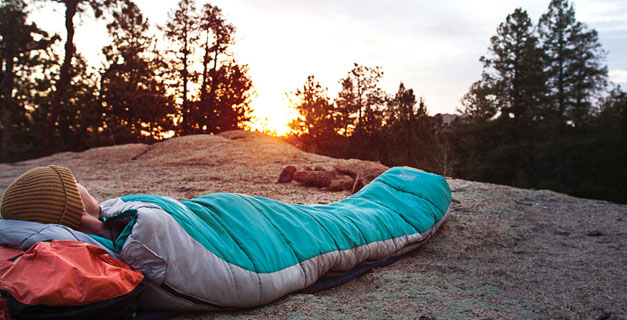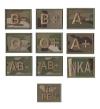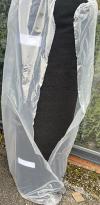A Guide to Lightweight Camping
When going camping it can very easy to over pack. However, this can very easily lead to overflowing rucksacks, aching backs and shoulders (and even injury), and generally ruin your trip.
Have you considered lightweight camping?
Lightweight camping is pretty straightforward – just stripping out all the gear that isn’t essential, and choosing products that are more compact and weigh less.
Firstly, you should leave behind non-essentials, but what should you take with you?
Lightweight camping tent
Your tent is probably going to be the heaviest piece of equipment you take with you, so it’s important to try and be as reasonable with space as you can. A one-person tent is ideal for the warmer months, although in winter you might want to consider a two-person tent to accommodate extra kit.
Wild Country & Terra Nova make excellent lightweight tents, but most brands such as Highlander have suitable selections, like the Blackthorn tent.
Helpful tip:
Use nearby rocks as tent pegs.
Lightweight sleeping bag
Getting a good night’s sleep is important, and going lightweight doesn’t mean you have to forego getting some decent shut eye. Mummy sleeping bags are a good choice, as they tend to be warmer, lighter and have a smaller pack size. Snugpak have sleeping bags that have a good comfort temperature along with a suitable pack size.
Then it’s a choice between down and synthetic filling. Down is lighter, packs smaller, and has incredible warmth-to-weight ratio – although it is more expensive, damp/wet conditions can affect the performance of the bag. Synthetic is cheaper but generally heavier and bulkier.
Opt for a 1-2 season sleeping bag in nice weather to cut down on the bulk. You could use a 1-2 season bag even in colder weather, and just put more layers of clothing on or use a sleeping bag liner, but we’d always recommend having a sleeping bag that provides the appropriate level of warmth.
Season Season Rating Perfect for… Temperature Range
Summer
Season One Summer camping where weather is mild. Indoor use. +5 degrees
Season Two The UK late spring to early autumn temperatures. +0 degrees
Winter
Season Three Autumn/Winter. Mild to cold nights, without frost but feeling chilly. 0 to -5 degrees
Season Four Cold winter nights where it may even be frost/snow. –12 and lower to +8 degrees
Lightweight sleeping mat
A good quality sleeping mat is also a key part of getting a good night’s sleep, it’s worth getting a good one. Granted, you could opt not to take a mat if you really want to cut down on bulk.
¾ length self-inflating mats are a great option, as they’re nice and comfy and also pack pretty small. For winter, even if you’re trying to go lightweight, we’d still advise taking a full-length sleeping mat, as they’ll help reflect the heat back up to your body and reduce cold spots coming through the cold ground.
Helpful tips:
Use a cheap foil emergency blanket under your sleeping mat for extra insulation.
Use your backpack instead of a pillow.
Lightweight stoves & cookware
If you’re going to be doing a spot of cooking, then you’re going to need a lightweight stove and cookware
Jetboils are excellent at what they do, boiling water very quickly, but they can be a little bulky. However there are large ranges of smaller camp stoves that will help reduce space, but may take longer to heat food. The Highlander Blade Mark II can boil 500ml of water in under 3 minutes! Size: packed 15cm x 11.7cm. Weight: 393g (unboxed), 495g (boxed).
Lightweight rucksacks & backpacks
The time of year and extent of the lightweight camping trip will determine the size of rucksack you will need. Around 60L capacity should be fine for most camping – however, in summer you should be able to use an even smaller rucksack as you’ll need fewer layers and a thinner sleeping bag. Dry bags are a great idea to keep your kit dry and organised.
Helpful tips:
If you’re taking a map, cut out and take with you only the bit you need.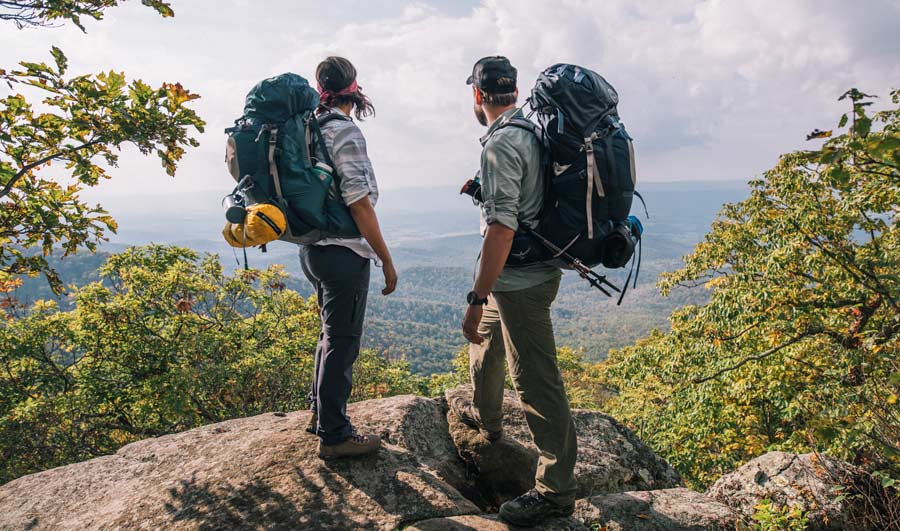
Toilet paper – remove the cardboard center, so it packs flat, and put it in a plastic bag.
Cut up a straw. Fill the pieces with toothpaste for one-use packets. Seal the ends. With a lighter
Use a head torch rather than carrying a bulky torch in your back.
Make a small first aid kit – put plasters, a few pills, antiseptic wipes, and whatever else will fit in to a little pouch.
Dry out your gear – if it gets wet, then it’s going to weigh a lot more than if it’s dry.
Try a microfiber instead of a beach towel
Clothing
When camping you only need the essential items of clothing, as this can be the main cause of over packing, due to the weather being temperamental.
Try layering thin clothing rather than bringing big, bulky items – base layers are ideal for this, helping to keep you warm while taking up very little room. Garments made from merino wool are also good as it’s quite lightweight and dries quickly if it gets wet.
In terms of footwear, ditch the walking boots and try walking shoes or trail shoes instead. They’re much more lightweight and should be perfectly suitable for most short to mid-length walks. However if you do need more substantial boots there are a large range such as the Aigle boot that are sturdy but not too heavy.
Food
Food is another part of packing that can be very heavy and take up a lot of space. Dried and dehydrated food is ideal. It won’t spoil as easily, but it also packs much smaller than regular food. You can have whole meals without having to take all the ingredients separately – and don’t worry, they’re very tasty and nutritionally balanced!
Water
Water is absolutely essential to your well being when camping or backpacking, so always make sure you have access to some, one way or another. You’ll need it for drinking and for cooking if you’re using dried food, so always ensure you have enough. Ensuring you have a strong substantial water bottle is key when outdoors – Klean Kanteen offer bottles that are saf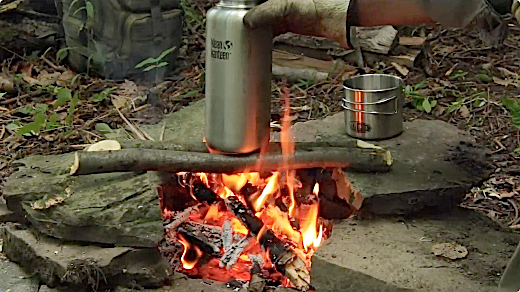 e to use with all liquids hot or cold and lightweight
e to use with all liquids hot or cold and lightweight
Use a collapsible water container or carrier so when it’s empty, it’s much easier to store. You can also buy hydration bladders that will fit inside most rucksacks if you have space.
You may have access to natural fresh water while you’re away, such as a tarn, and if you want to get your water from there, make sure you have water purification tablets with you or UV water purifiers that are lightweight and reliable (it’s good to have some of these with you anyway). However, to be on the safe side, try and stick to running water if possible.
Helpful tip:
Use cold or frozen water bottle to keep food fresher for longer - this can also be used as an ice pack in the case of an injury
One last and very important tip: never take any unnecessary risks when lightweight camping. Always make sure you have enough equipment with you to stay warm, fed and hydrated.


